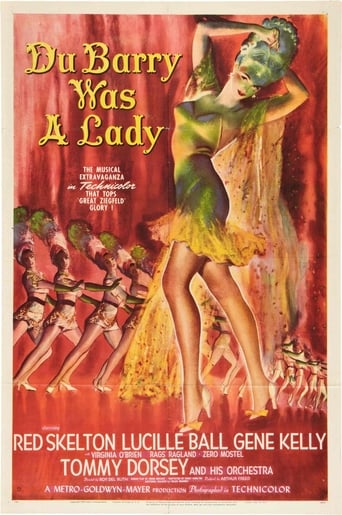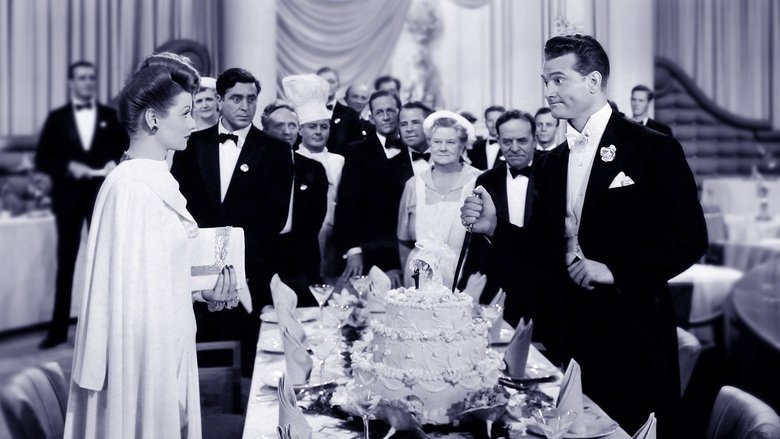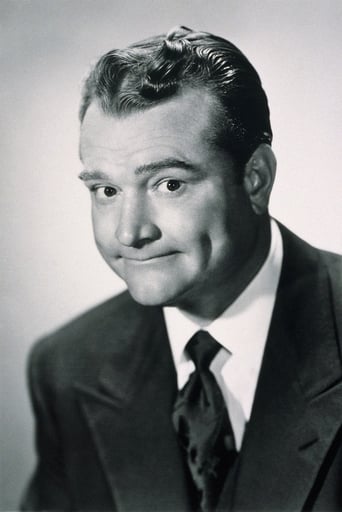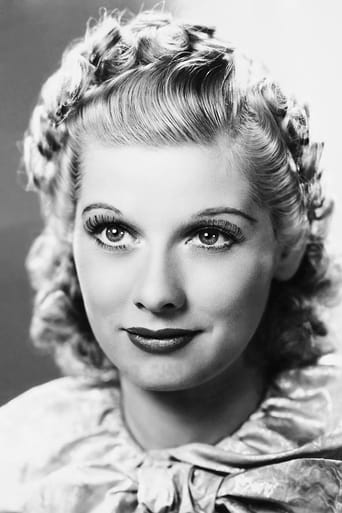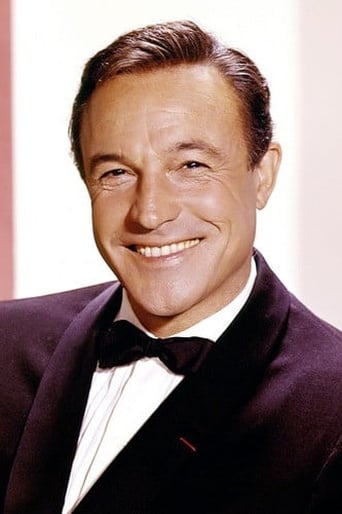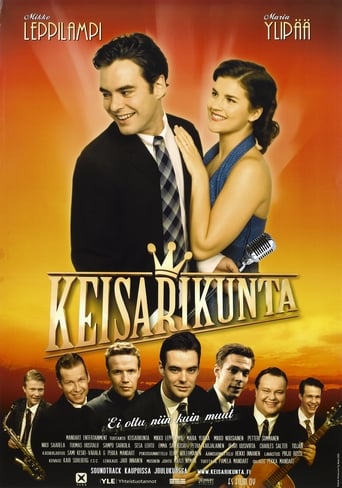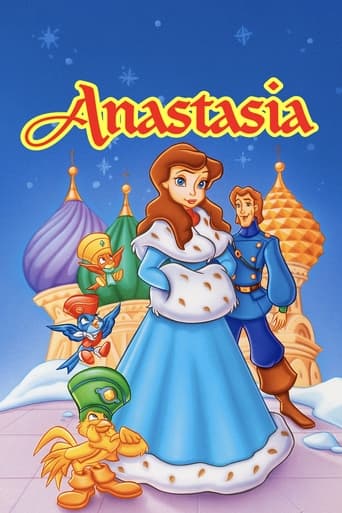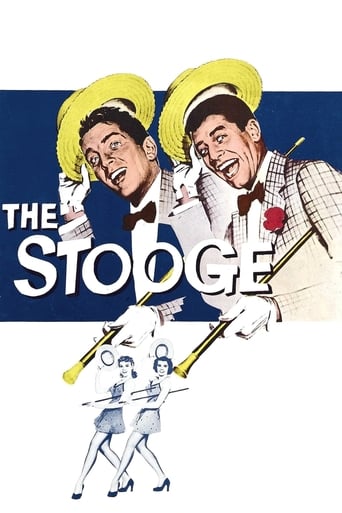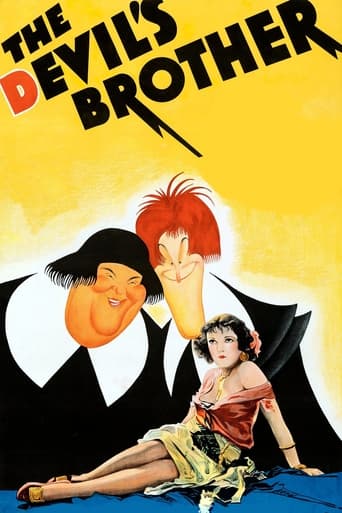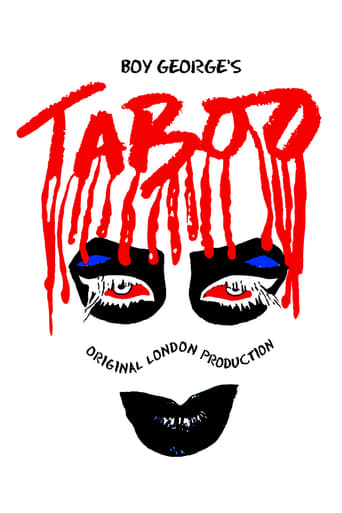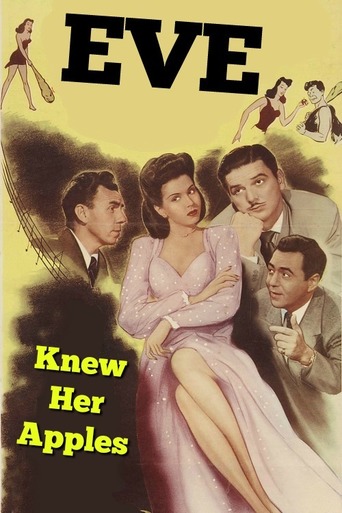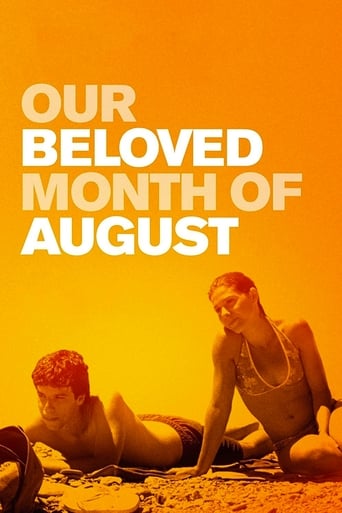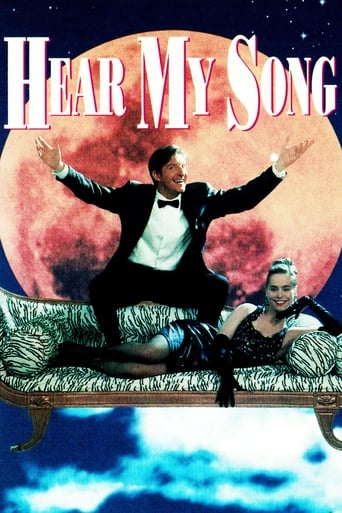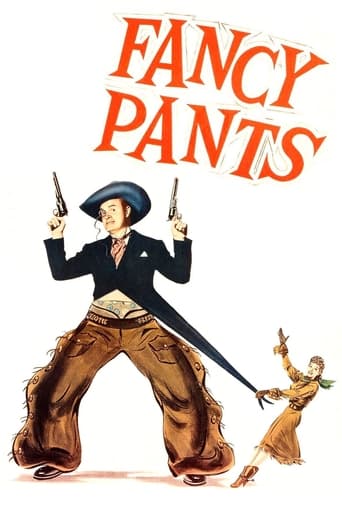Du Barry was a Lady (1943)
Hat check man Louis Blore is in love with nightclub star May Daly. May, however, is in love with a poor dancer but wants to marry for money. When Louis wins the Irish Sweepstakes, he asks May to marry him and she accepts even though she doesn't love him. Soon after, Louis has an accident and gets knocked on the head, where he dreams that he's King Louis XV pursuing the infamous Madame Du Barry.
Watch Trailer
Cast


Similar titles
Reviews
Boring
It's funny, it's tense, it features two great performances from two actors and the director expertly creates a web of odd tension where you actually don't know what is happening for the majority of the run time.
Just intense enough to provide a much-needed diversion, just lightweight enough to make you forget about it soon after it’s over. It’s not exactly “good,” per se, but it does what it sets out to do in terms of putting us on edge, which makes it … successful?
One of the film's great tricks is that, for a time, you think it will go down a rabbit hole of unrealistic glorification.
There have been quite a few films dealing with the life of 18th century French courtesan Madame Du Barry. But, I'll bet none of the others remotely approach this treatment. Actually ,only about the last half features the court of Louis XV, with Lucille Ball as the Madame. It's essentially a lavish musical variety farce, loosely based on the play of the same title. Most of Cole Porter's songs have been deleted for the film, and new ones added. Among Porter's songs retained are "Do I Love You?" , "Katie Went to Haiti", and "Friendship". Many details of the screenplay were also altered from the play. Apparently, The Black Arrow component was tacked on to the film version. The Black Arrow was the hero of a R.L. Stevenson novel set in 15th century England. Thus, there is no historical connection to 17th century France.We have 3 multitalented leads in Red Skelton as Louis XV, Lucy as Madame Du Barry, and Gene Kelly as The Black Arrow. They, along with various others, alternate between singing, dancing, verbal and physical comedy, and strait story. Also present is Virginia O'Brien, as the cigarette girl, who wants to marry a reluctant Skelton, as Louis, the hat check man who morphs into Louis XV in his drug and bumped head-induced dream. Virginia gets to sing "Salome" in her trademark deadpan style, which enjoyed some popularity as a novelty during this era.This was Lucy's first Technicolor film, and she took advantage of it by dying her hair a bright orange. She sure looked great throughout, along with many other beautiful ladies who were shown for just a few moments. This was also her first MGM film, having been acquired from RKO. This was only Kelly's second Hollywood film and, again, his first in Technicolor. Skelton had been kicking around MGM for a few years. However, this is probably also his first Technicolor film.Kelly and Lucy would later develop much more of a comedic dimension to their acting. Probably 90% of the comedy here was generated by Skelton, with some input from Rags Ragland and Zero Mostel. The latter played a swami who parodies Charles Boyer, especially in "Algeria". The opening chorus girls also have Swami turbans. The Swami theme soon disappeared.Kelly gets one solo dance routine in tux and tails, not especially innovative. Otherwise he spends his time mooning over Lucy's character or playing The Black Arrow, who wants to lead a revolution against the French monarchy. The Tommy Dorsey Band gets more exposure here than in other films I've seen. This sometimes includes The Pied Pipers, including Jo Stafford. I definitively prefer Jo's recorded version of "Do I Love You" over Kelly's singing here. The 3 Oxford boys do an amusing vocal parody of some of the popular dance bands of the day, including : Kay Kaiser, Fred Warring, Harry James, and Guy Lombardo.The basic plot is a romantic foursome, where it's not crystal clear who is going to end up with whom until the finale: a very common plot in musicals of that era. Skelton's and Kelly's characters both want to marry Lucy's character. But she rejects both because they aren't rich enough. She does have some romantic feelings for Kelly, but not Skelton. However, Skelton wins the Irish Sweepstakes. Now , he feels confident in asking Lucy to marry him. She has said it's better to marry for money than love. She tentatively agrees to marry him. However, he soon is bankrupt, having spent or given away all his money except what he owes the IRS. See the ending to find out how things work out. The finale has the principals singing "Friendship".
I noticed that one reviewer called this film 'choppy' and I think this is a very apt description. Unlike the typical musical, "Du Barry Was a Lady" was very choppy--mostly because there was scant plot and too many songs. Because of this, it often comes off like a talent show more than a movie.This is a very unusual film in that Lucille Ball is cast as a sex symbol. Now I am NOT trying to be mean, but Ball was mostly considered to be a goof-ball in films--a lightweight second banana, not a star...and not a siren. It's also odd because it's a musical and in some numbers, she's clearly being dubbed. Because of this and her later "I Love Lucy" persona, it is hard today to see why all the guys are going gaga over her in the film...but they are. Her main admirers are Red Skelton and Gene Kelly. Because Kelly was very much a newcomer in films, he gets third billing. A very odd fourth was Zero Mostel (in his first film). I say odd because he was cast in a role much like you'd expect to see Phil Silvers--as the goofy friend. This role just didn't work well and his part seemed rather forced. Plus, with him, Skelton and Rags Ragland, the film was made up almost exclusively of comic relief! About 2/3 of the film was set in the present--wartime USA. The only Du Barry is a character Lucile Ball plays in a nightclub. As I said above, all the guys seem nuts for her. She loves one of them (Gene Kelly) but won't give him the time of day because he's poor--and she wants a rich husband. The other (Red Skelton) is poor but unexpectedly wins the Irish Sweepstakes and because of this, Lucille seems very willing to marry him. However, before they marry, Red accidentally slips himself a Mickey Finn and in his delirium, he dreams he's Louis XV and Lucille is really Madame Du Barry. And, when he awakens, he realizes that he should NOT marry a lady who doesn't love him and gives Gene and Lucille his blessing.The film has a few funny wartime jokes (such as references to tires and taxes) but the humor is so little and far between that it cannot possibly save the film. With more humor, it might have worked--or if the entire film had been set during the reign of Louis. Instead, it's one song after another after another and the plot just doesn't seem important at all. And, because of this, there are just too many lulls to make this worth your time unless you are insanely devoted to Skelton, Ball or Kelly...insanely.By the way, the DVD is not a total loss. The two shorts on the disc ("Seeing Hands" and "Bah Wilderness") are very good--very, very good.
I have no idea how the movie compares to the play it was based on. But the movie was meant to be light wartime entertainment, a relief from the hardships and dreariness of the times. The movie may not have had depth, but it wasn't really intended to. It was meant to show pretty sets and pretty girls and silly comedy and entertaining music.On its own merits, it achieves it goals. The storyline is about the question of marrying for love or money, but that is secondary to the slapstick performance of Red Skelton or the music of Tommy Dorsey and his musicians or the displays of feminine beauty. The scene where the French peasants revolt against the king in the dream sequence also serve as subtle wartime propaganda.The movie is also the first major film starring Lucille Ball, who gives a straight performance compared to the clowning she would be known for later in her career. Good as a period piece, but it makes no pretensions of high art.
"Be brave, my friend. You are dying for your country!" says The Black Arrow (Gene Kelly) to his pal, the grubby Taliostra (Zero Mostel), as the tumbrel bears them to the guillotine. "Yeah," says Taliostra, "but I was born in the city." Expect much more of the same with Du Barry Was a Lady. The 1939 Broadway smash starred two powerful performers, Bert Lahr and Ethel Merman, a first rate, innuendo-filled set of songs by Cole Porter, and lots of girls and gags. So what did MGM do when the studio bought the rights? Ditched Merman and Lahr and almost all of the Porter songs. (To be fair, a good many of Porter's lyrics would not have gotten past Hollywood's Code of Decency). MGM kept the girls. MGM bought the rights for three reasons...to have a vehicle to showcase its up-and-coming comic lead, Red Skelton; the same with their newest knockout beauty coming to them from RKO, Lucille Ball; and to use Gene Kelly until they could figure out what to do with him. Skelton plays Louis Blore, a hatcheck boy at a posh New York nightclub who has a crush on May Daly (Ball), the club's headliner. But she wants security, not love. Still, we know she likes Alec Howe (Kelly), the nightclub's MC, dancer and songwriter, who loves her. When Louis wins the lottery, May decides to marry him. But then a mistaken mickey knocks Louis out and he wakes up as Louis XV, with May as Madame Du Barry and Alec as Black Arrow, the dashing fighter for freedom. All those comic relief employees of the nightclub, the likes of Mostel, Rags Ragland and Virginia O'Brien, show up as peasants or nobles, along with just about everyone else Louis had met in the nightclub, including Donald Meek. Things finally are resolved, with happiness all around, when Louis comes to and finds himself back in the nightclub with May, Alec and all his pals. The movie has that smooth, unreal MGM Technicolor gloss that can make even genuine talent seem artificial. The best thing that can be said is that the movie has a few highlights and a great deal of barely imaginative but skilled professionalism. To substitute for the songs by Porter that were pitched, there is, in my view, a hodge-podge of mostly second- rate and facile Hollywood music and lyric writing. In place of Porter's clever, sophisticated and amusing songs, including the inventive and salacious "But in the Morning, No" where he comes up with some startling metaphors for sex in the a.m., we're stuck with "Madame, I Love Your Crepes Suzettes" and "I Love an Esquire Girl." Even Lahr wouldn't be able to make these lyrics funny. All Skelton does is mug and prance while he performs them. If you like Red Skelton, you might enjoy Du Barry Was a Lady. He's in almost every scene, doing all of his usual shtick. For me, Skelton was at his most appealing when he wasn't doing all the grab-'em-by-the-throat clowning, Give me the Skelton who was Wally "The Fox" Benton, master sleuth on radio, inept in real life, in Whistling in the Dark (1941) (1941), Whistling in Dixie (1942) and Whistling in Brooklyn (1943). Lucille Ball is a knock out, strikingly gorgeous and with that skeptical, smart look about her that, I think, perpetually flummoxed studio heads. Those arched eyebrows of hers made her a challenge to cast. One of her most sympathetic and amusing roles, I think, was in Lured (1947), but it didn't do her career much good. More than anything else, I think it's Gene Kelly's singing and dancing to Porter's great song, "Do I Love You, Do I" that establishes how out of sync this movie is with any sense of style or respect for excellent material. The song is one of the few from the Broadway show that was kept. To do it justice (even knowing that Merman introduced it) it needs the languid sophistication of a Lee Wiley or even the driving treatment Peggy Lee gave Lover. Instead, we have a typically Kelly interpretation, all on the surface, singing and tapping, and then a fast, athletic performance with chorus girls set to a blaring, flashy orchestration. Whoever was responsible for the grotesque treatment this great song received should have had their taps stapled to their lips. Here are the words. Perhaps you'll recall the melody. Do I love you, do I? Doesn't one and one make two? Do I love you, do I? Does July need a sky of blue? Would I miss you, would I? If you ever should go away? If the sun should desert the day, What would life be? Will I leave you, never? Could the ocean leave the shore? Will I worship you forever? Isn't heaven forever more? Do I love you, do I? Oh, my dear, it's so easy to see, Don't you know I do? Don't I show you I do, Just as you love me. For good measure, the movie also gives us Tommy Dorsey and his orchestra, an unbilled Jo Stafford and the Pied Pipers (with Dick Haymes), and a curious trio called The Three Oxford Boys who imitate various dance bands by humming through their noses. The movie is glossy and bright, and if you can tolerate Red Skelton's continuous mugging and pratfalls, it might be worth a look.

